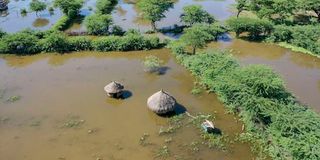Climate crisis is no longer a concern for the future

Salabani village where the rising water levels of Lake Baringo have now flooded displacing entire villages near Marigat, Baringo County on October 6, 2020.
The world marks Earth Day today. The event, under the theme “Restore Our Earth’, gives world leaders a platform to share the strides they have made in conserving the environment.
During this time, US President Joe Biden will also be marking his 90 days in office with a virtual meeting with African leaders. Top of the agenda will be climate change and science.
Among the attendees are President Uhuru Kenyatta, Nigeria’s Muhammadu Buhari, Brazil’s Jair Messias Bolsonaro, DR Congo’s Félix Tshisekedi, and South Africa’s Cyril Ramaphosa.
Africa suffers the most from the effects of climate change despite contributing the least to climate change. This is an opportunity for African leaders to seek concrete plans the first word nations are taking to deal with climate change at home and abroad.
Like most African nations, Kenya faces climate change in the form of extreme and unpredictable weather patterns, floods, prolonged droughts, subsequent crop failures, desert locusts’ invasion, and rapid desertification, among others. These have already begun to change the face of our continent.
According to the World Health Organization, as of the year 2030, climate change is expected to contribute to approximately 250,000 more deaths per year from malnutrition, malaria, diarrhoea and heat stress.
Climate change
Africa’s restoration opportunity is the largest of any continent in the world. Despite being least responsible for climate change in terms of emissions, we must step up and show leadership in the development path that we choose; we must get it right. We also have to walk the talk.
If we are making commitments, we need to see those commitments reflecting today’s decisions from the national to the county levels.
While long-term commitments send critical signals, it is the decisions we make today that matter. African leaders to this important summit should express the need for fast-tracking these commitments on the global stage. The countries that have contributed heavily to global warming should not say they are working on a 2060 plan.
Commitments and pledges are not enough. They mean nothing if we don’t take immediate, decisive action. For example, President Kenyatta’s commitment to ensure that Kenya attains a 10 per cent forest cover by 2022 is welcome - but this commitment means nothing if we can go on a haphazard felling of trees in the name of building a road.
The ongoing clearing of trees to make room for the Nairobi Expressway is unacceptable as it puts us and our planet at risk and compromises the President’s commitment. Every form of infrastructure development and plan must put people and our planet above profits.
Concrete jungle
Nairobi, the once green city, is slowly morphing into a concrete jungle. With more vehicles on our roads, air pollution is getting dangerously high. We are felling trees that would have helped in absorbing carbon dioxide and replaced it with oxygen.
The damage we have done to our planet has continued to directly impact our well-being, human health, and the road towards a sustainable future.
Kenya’s skyrocketing debt, for instance, affects our ability to solve climate change issues. Marginalised communities are already bearing the brunt of climate change realities like drought and floods, besides the effects of Covid-19.
Add to the anxiety from our government’s appetite for borrowing as was recently revealed in the Infotrak Survey on ethical development, and we are staring at the actual definition of people being between a rock and a hard place.
We must see the connections between unsustainable development and how it causes climate change and, indeed, pandemics like Covid-19. If we refuse to see these connections and start restraining our appetite for loans to build concrete jungles, nature will win out in the end.
Man’s existence on this planet is temporary, and nothing puts this into perspective like the Chernobyl disaster in Ukraine. Nature survived, and vegetation is slowly coming back to life decades later. We may engage in environmentally harmful activities, but in the end, nature will recover, but humans will not.
The leaders’ meeting at this summit should make binding and immediate decisions for the sake of the children who will need a healthy environment.





